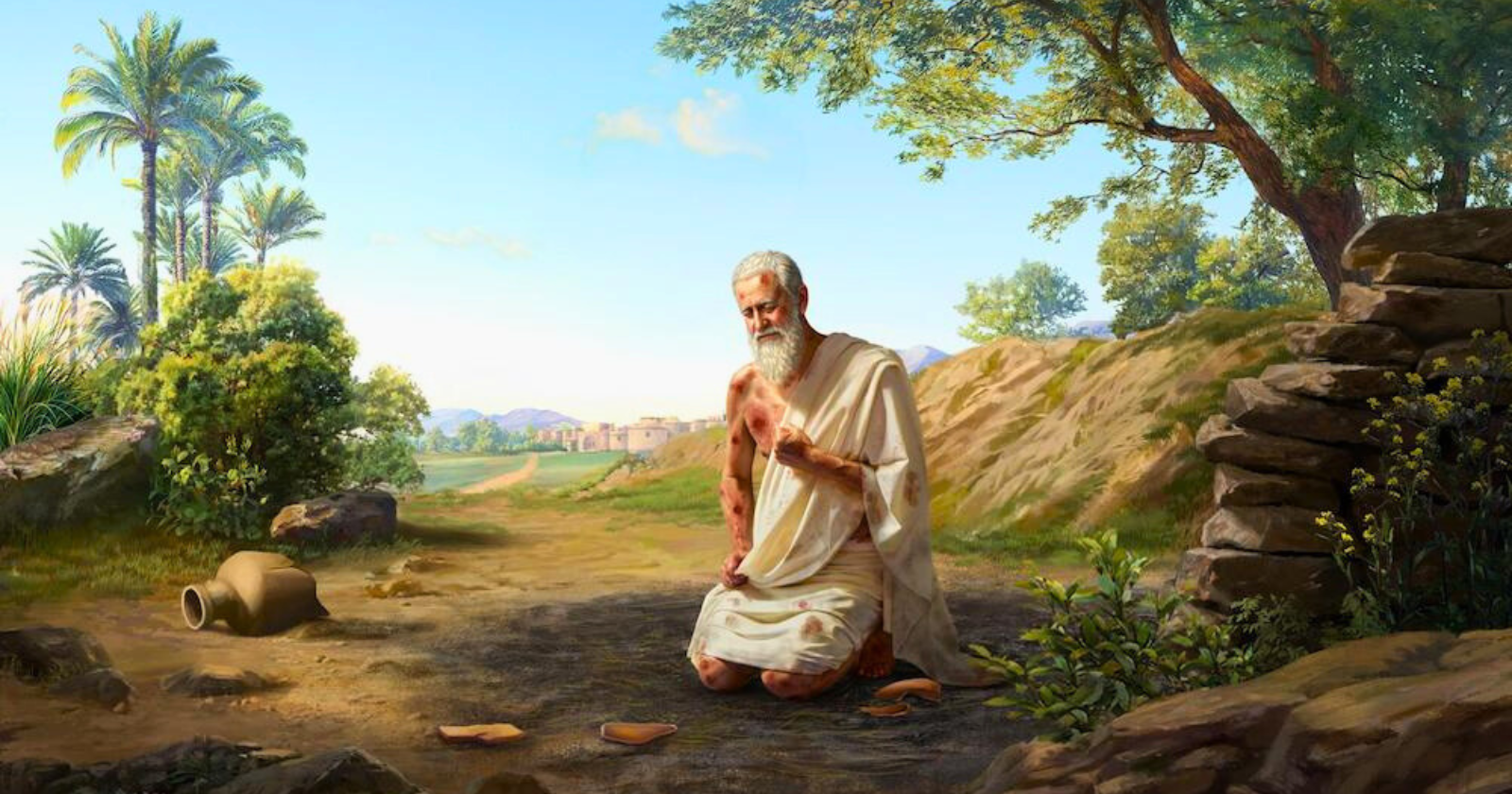The Book of Job delves into the intricate themes of suffering, faith, and divine justice, challenging believers to find meaning in adversity.
This poetic scripture confronts the timeless question of why a good God allows bad things to happen to righteous people.
In this exploration, we’ll uncover the key messages and life lessons embedded within Job’s trials and his enduring faith amidst profound loss.
Our journey through Job’s story will offer practical insights for weathering life’s storms with spiritual resilience. We will also touch on Job’s profound dialogue with God and its implications for our own faith journeys.
Who is Job in the Bible?
Job is a central figure in the Book of Job, which is part of the wisdom literature of the Bible.
He’s often described as a wealthy and pious man, living in the land of Uz. Job is known for his deep faithfulness to God, despite facing tremendous personal loss and suffering.
The narrative begins with God allowing Satan to test Job’s piety, leading to a series of devastating trials for Job.
In particular, he loses his property, his children, and is afflicted with painful sores.
Yet, in the face of these hardships, Job’s commitment to God does not waver. Instead of turning away, Job’s faith is actually strengthened.
Surprisingly, he refuses to curse God, despite the urgings of his friends and even his wife.
Job’s story is particularly remarkable for its exploration of suffering, faith, and righteousness. His friends suggest his misfortunes must be a punishment for sin, but Job maintains his innocence.
The dialogue that unfolds addresses profound questions about why the righteous suffer and the nature of God’s justice.
Key themes in the Book of Job
The Book of Job delves into several key themes, each offering rich insights into the human condition and the nature of divine interaction.
These themes form the backbone of the narrative, guiding readers through Job’s intense journey of suffering, faith, and restoration.
Specifically, they include the question of why the righteous suffer, the sovereignty and justice of God in the face of human suffering, the inadequacy of traditional wisdom to explain all life experiences, and the complexity of faith and piety under duress.
Divine justice vs. human understanding
One of the most obvious themes in the Book of Job is the concept of divine justice versus human understanding. This theme challenges the belief that good people always experience prosperity, while the wicked suffer.
Job’s story is a testament to the complexity of suffering.
Despite his righteousness, he faces severe trials and losses, which confound the expectations of his friends and himself.
For example, the dialogue between Job and his friends in Chapter 2 reveals a struggle to comprehend God’s ways. They argue that suffering is a punishment for sin, a view Job disputes, knowing his conscience is clear.
God’s response to Job does not offer a direct explanation for suffering. Instead, it emphasizes the vast gap between divine wisdom and human knowledge, suggesting that some aspects of God’s plan are beyond human understanding.
Suffering and sovereignty
Christians often turn to the Book of Job when they’re grappling with the question of why suffering occurs, especially to those who seem undeserving.
Throughout the narrative, Job’s adversity is not attributed to any wrongdoing on his part, challenging the common belief of his time that suffering was a direct result of sin.
Job’s friends insist on this causal relationship, yet Job’s experience suggests otherwise.
This theme resonates deeply with readers, as it addresses the universal experience of pain and the often human instinct to search for a reason or cause.
Job’s story encourages a shift in perspective from seeking reasons for suffering to finding ways to persevere in faith and integrity in the midst of it.
However, keep in mind that God’s eventual response to Job does not directly address the question of why the righteous suffer.
Instead, it affirms His sovereignty, illustrating the grandeur and complexity of creation, which surpasses human understanding.
Based on this response, we can assume that God’s ways are inscrutable and not always for us to comprehend.
Faith under trial
The Book of Job deeply explores the theme of faith under severe trials.
It begins with an introduction to Job’s character—he is described as a blameless and upright man who fears God and shuns evil. His prosperity is vast, consisting of a large family and extensive flocks.
Therefore, Job’s journey begins with immense prosperity and happiness, which is dramatically upended by a series of catastrophic events that leave him in profound suffering and loss.
Despite the sudden calamities that strip him of his children, wealth, and health, Job’s faith in God endures.
Rather than succumbing to despair or renouncing his faith, Job’s initial response is one of worship and acceptance of God’s sovereignty, signifying his deep trust in God regardless of his personal circumstances.
So, here’s the thing:
Job’s story emphasizes that true faith is tested and revealed in the face of adversity. It challenges the notion that righteousness always leads to material blessings and instead presents a more complex understanding of suffering and divine will.
Through Job’s trials, the narrative invites reflection on the nature of faith, the reasons for suffering, and how believers relate to God during life’s most challenging moments.
Friends’ explanation of suffering
Job’s affliction draws the attention of three friends—Eliphaz, Bildad, and Zophar—who visit to offer their sympathy and counsel.
They observe Job’s suffering and, grounded in their belief in retributive justice, argue that Job’s pain must be a punishment for sin. They urge him to confess and repent to restore his fortunes.
But guess what?
Job rejects their explanations, asserting his innocence and challenging the notion that all suffering is a direct result of personal sin.
The friends’ arguments reflect a common ancient belief that prosperity is a sign of God’s favor, while suffering is a sign of His judgment.
Through three cycles of speeches, they debate with Job about the nature of God’s justice and the reasons for suffering.
Job insists on a direct audience with God to plead his case, deepening the mystery around the relationship between divine sovereignty and human suffering.
Despite the depth of his pain, Job’s resolve to seek answers from God himself remains unshaken, highlighting the central question of the book:
Why do the righteous suffer?
- Eliphaz: Suggests that suffering is a correction from God.
- Bildad: Argues that Job’s children died because of their sins.
- Zophar: Claims that Job’s suffering is less than he deserves.
The speeches of Elihu
As the debates between Job and his friends reach a stalemate, a younger man named Elihu enters the discourse.
Burning with anger at both parties, Elihu offers a fresh perspective on Job’s trials:
He criticizes Job for justifying himself rather than God and rebukes the friends for failing to provide satisfactory answers.
Elihu suggests that suffering may serve as divine discipline, not necessarily punishment for sin but a means to prevent sin and to cultivate character and humility.
He highlights the greatness of God’s justice and wisdom, indicating that human understanding of divine ways is inherently limited.
One of his notable quotes emphasizes this, as Elihu speaks of God’s majesty and power:
“For God is greater than any mortal. How can you argue with him about his decisions? You can’t! God is far too powerful for you to question him” (Job 36:22-26).
This prepares the ground for God’s own speeches, where the Lord answers Job out of the whirlwind, questioning him about the mysteries of the universe that are beyond human comprehension.
Elihu’s speeches introduce the idea that there might be reasons for suffering other than divine retribution.
His words prepare the way for God’s response, which will ultimately address the core issues raised throughout the dialogues.
God’s response
After the exhaustive dialogues between Job and his friends, the narrative progresses to the climactic intervention of God Himself.
Speaking out of a whirlwind, God addresses Job with a series of questions that underscore the vast gulf between human and divine understanding.
In a majestic display of rhetorical questioning, God points to the complexities of creation, from the foundations of the earth to the intricacies of nature, none of which Job can claim to comprehend or control.
God’s response emphasizes that the natural order is complex and often beyond human comprehension.
The message is clear:
Trust in God’s ultimate wisdom and justice is paramount, even when one’s suffering seems inexplicable.
This section reinforces the central theme of the Book of Job — humans may not always grasp the reasons behind their trials, but they are called to trust in the divine purpose and order.
Restoration of Job
Job’s ordeal concludes with a divine vindication of his righteousness.
After God’s speeches, Job is humbled and acknowledges his inability to understand the vastness of divine wisdom.
The Lord then turns to Job’s friends, rebuking them for not speaking truthfully about Him as Job did. They are instructed to offer a burnt offering with Job praying for them, which he does, further demonstrating his faithfulness.
In the epilogue of the book, Job’s fortunes are restored twofold, receiving double the wealth he originally had, along with a new family.
Finally, he is blessed with another seven sons and three daughters, renowned for their beauty.
Job’s long life, extending 140 years after these events, allows him to see multiple generations.
The restoration of Job serves as a narrative resolution that rewards righteousness and offers hope amidst suffering.
It reinforces the book’s overarching theme that faith in God can be maintained despite inexplicable adversity and that ultimate justice lies in God’s hands.
What can we learn from the Book of Job?
1) Understanding suffering
The Book of Job is often turned to when grappling with the question of why suffering occurs, especially to those who seem undeserving.
Throughout the narrative, Job’s adversity is not attributed to any wrongdoing on his part, challenging the common belief of his time that suffering was a direct result of sin.
In simple terms, Job’s friends insist on this causal relationship, yet Job’s experience suggests otherwise.
Here’s what it means for modern Christians:
Understanding suffering may not always be possible from a human standpoint. Instead, it proposes that trust in divine wisdom and justice, even when they are not apparent, is crucial.
That’s why we’re sure that the book ultimately serves not as an answer to the problem of suffering but as a testament to enduring faith and the complex nature of divine-human relationships.
2) Human righteousness
Job’s unyielding stance on his own righteousness against his friends’ accusations is a central theme of the text. His friends argue that suffering is a consequence of sin, implying that Job must have committed offenses to deserve his fate.
However, Job maintains his innocence and challenges this simplistic view of divine justice.
The narrative explores the concept of human righteousness in the face of divine omnipotence. It confronts readers with the tension between Job’s understanding of his own integrity and the mysterious ways in which divine justice operates.
This theme probes the depth of human morality and its recognition by God, suggesting that human righteousness is not merely transactional but recognized by God despite life’s inexplicable hardships.
3) The role of repentance
Despite his insistence on his innocence, Job ultimately repents for questioning God’s wisdom.
His repentance is not an admission of guilt for the tragedies that befell him but rather a humble acknowledgment of his limited understanding of God’s grand design.
Why this act of repentance is crucial?
Well, it reflects a transformative journey from questioning to submission to divine will.
And most importantly, it highlights repentance as a profound recognition of humanity’s place before an incomprehensible divinity.
The Book of Job, thus, positions repentance not as an act tied to specific transgressions but as a profound realization of one’s position in the cosmos and before God.
Final thoughts: Embracing life’s mysteries
To sum up, the Book of Job is a profound exploration of faith under trial and the quest for understanding amidst the enigmas of human existence.
It challenges believers and seekers alike to confront the limits of human wisdom and to embrace the mysteries that surround life’s most difficult questions.
If you’re seeking to delve further into the richness of this biblical text, consider these next steps:
- Reflect on the dialogues within the Book of Job and identify with the characters’ diverse perspectives on suffering and divine justice.
- Contemplate the nature of your own suffering or that of others around you. How does Job’s steadfastness inspire resilience in your faith journey?
- Explore how the themes of the Book of Job resonate with contemporary issues and personal experiences. What insights does it offer for enduring trials in today’s world?
As you continue to seek wisdom and understanding through the pages of Scripture, may you find solace in knowing that you are not alone in your quest.










